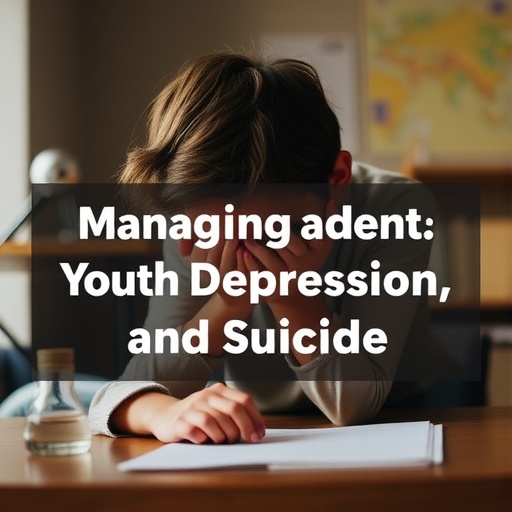In a profound study that seeks to illuminate the intricacies of mental health communication within families, researchers have turned their attention to the critical aspect of parent-child dynamics in the context of depression and suicidal ideation among youth. Understanding how parents and children perceive the emotional states of one another can provide essential insights into the effectiveness of interventions aimed at mitigating the risks associated with such mental health issues. The importance of recognizing and bridging any gaps in perception may hold the key to facilitating better developmental outcomes for adolescents facing mental challenges.
The study, conducted by Bivins et al., presents a compelling exploration into the levels of agreement between depressed youth and their parents regarding the former’s depressive symptoms. This topic is particularly significant given that depression in youth can often go unrecognized or misinterpreted by parents, leading to insufficient support for the affected child. The ramifications of such misunderstandings can be dire, potentially escalating feelings of isolation or hopelessness in the young person, and increasing the likelihood of suicidal thoughts or behaviors.
Disturbingly, statistics suggest that a significant portion of youth experiencing depression do not receive the necessary support. This gap can arise from various factors, including the lack of open communication channels between parents and children, differing views on what constitutes signs of depression, and societal stigma surrounding mental health discussions. The study aims to address these issues by examining how well parents can identify depressive symptoms as reported by their children, particularly when those children may be experiencing intense emotional turmoil.
The findings of the research indicate that there is often a disconnect in the perceptions of depressive symptoms between parents and their children. While parents may believe they are attuned to their children’s emotional landscapes, the truth may reveal a more nuanced reality where children feel misunderstood or overlooked. This misalignment can lead to critical delays in seeking help or initiating necessary conversations around mental health, which are essential for healing and recovery.
Bivins and colleagues utilized a robust methodology to assess the levels of agreement on reported symptoms. Through surveys and interviews conducted with a diverse cohort of families, they measured both parents’ understanding of their children’s depressive symptoms and the youths’ self-reports. The study’s rigorous approach adds credibility to its conclusions, highlighting the need for improved communication strategies within families striving to manage mental health challenges collectively.
In the current climate of heightened awareness around mental health, this research sheds light on an often-overlooked aspect: the role of familial relationships in shaping mental health outcomes. The study serves as a clarion call for parents to engage more deeply with their children, fostering an environment where expressing emotions and discussing psychological struggles is normalized. Creating an open dialogue can lead to more accurate interpretations of emotional distress, ultimately resulting in better support mechanisms.
Moreover, the implications of this research extend far beyond individual families. Social support systems, educators, and mental health professionals must recognize the significance of parent-child communication in addressing youth depression. By promoting awareness of this dynamic, communities can develop targeted programs that equip both parents and children with tools to engage in healthy conversations about mental health.
This study also emphasizes the necessity for mental health education to be accessible and digestible for families. Programs aimed at increasing awareness, understanding, and empathy concerning adolescent mental health can play critical roles in bridging the gap identified by Bivins et al. By empowering parents with knowledge about the signs of depression and effective ways to communicate about feelings, we can foster resilience and help young people navigate their emotional struggles more effectively.
The mental health crisis affecting today’s youth requires an integrated response that considers the vital roles parents play in their children’s lives. Each family interaction has the potential to serve as a protective factor against the debilitating effects of depression. By harnessing the power of familial relationships, we can create a bastion of support that not only helps youths to express their feelings but also equips parents with the insight needed to respond appropriately.
As research continues to evolve, it becomes increasingly clear that addressing youth depression is not solely the responsibility of healthcare professionals; rather, it is a collective endeavor that encompasses families, communities, and society at large. The findings of this study remind us that effective mental health care begins at home, where understanding, support, and unconditional love set the foundation for growth and healing.
The implications of these findings cannot be understated. They advocate for a shift in the traditional paradigms of mental health discourse, suggesting that by enhancing the quality of parent-child communication, we can mitigate risks associated with depression and suicidal ideation among youth. This research possibly paves the way for future studies that delve deeper into understanding these dynamics and testing interventions designed to improve family communication related to mental health.
In conclusion, the study undertaken by Bivins et al. represents a significant step toward recognizing and addressing the complexities of youth depression within the familial context. By applying these insights, we can foster a supportive environment that encourages open discussions about mental health, ultimately leading to healthier outcomes for children and families alike.
Subject of Research: Parent-Child Agreement on Depressive Symptoms in Depressed and Suicidal Youth
Article Title: Parent-Child Agreement on Depressive Symptoms in Depressed and Suicidal Youth
Article References:
Bivins, E.J., Buckland, E.K., Pinciotti, C.M. et al. Parent-Child Agreement on Depressive Symptoms in Depressed and Suicidal Youth. J Child Fam Stud 34, 2358–2368 (2025). https://doi.org/10.1007/s10826-025-03159-z
Image Credits: AI Generated
DOI: https://doi.org/10.1007/s10826-025-03159-z
Keywords: Parent-Child Communication, Youth Depression, Mental Health Awareness, Suicidal Ideation, Family Dynamics




